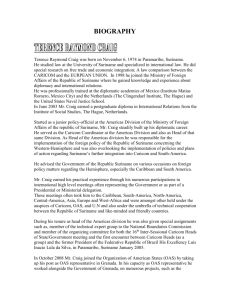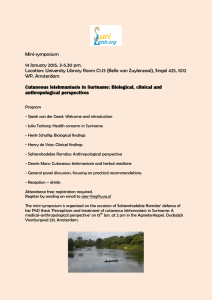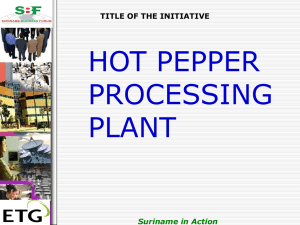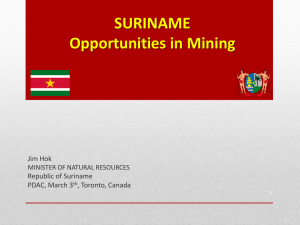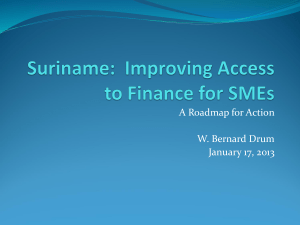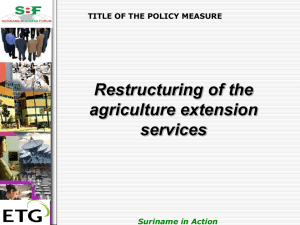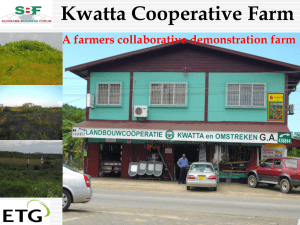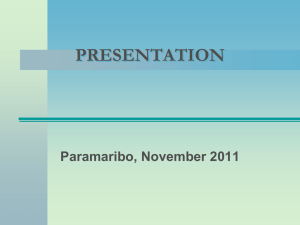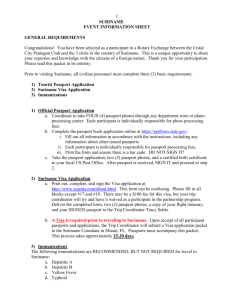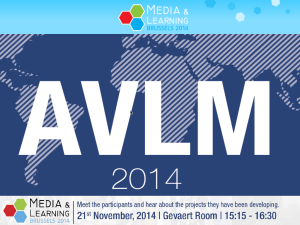II. trade policy regime - SICE - Organization of American States
advertisement
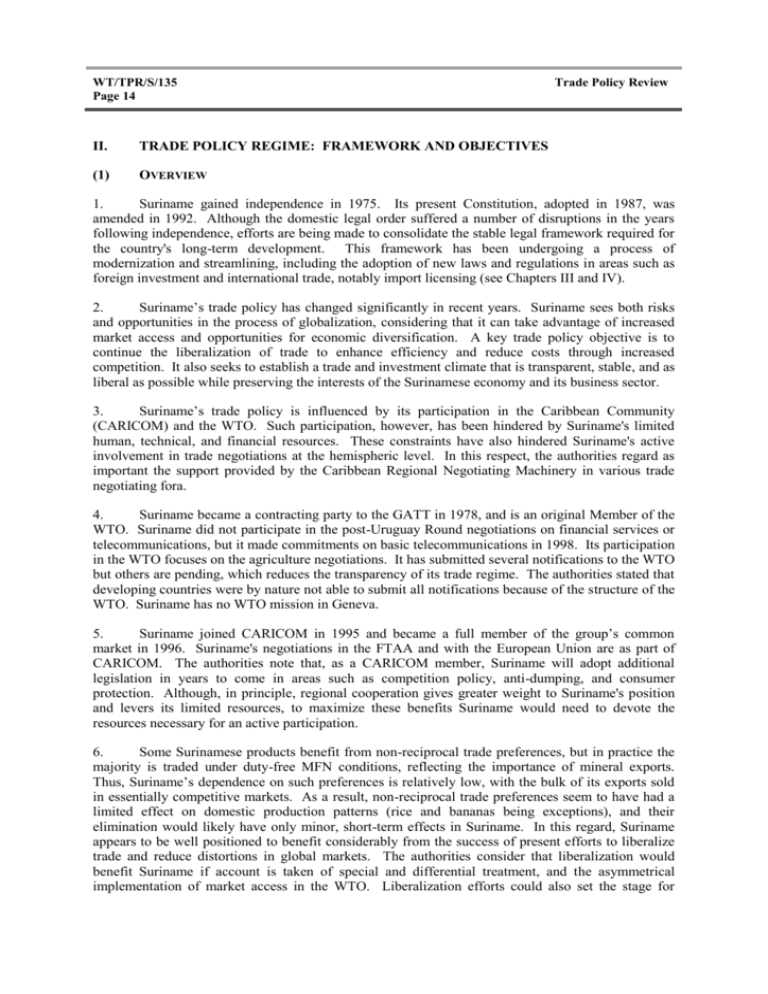
WT/TPR/S/135 Page 14 II. TRADE POLICY REGIME: FRAMEWORK AND OBJECTIVES (1) OVERVIEW Trade Policy Review 1. Suriname gained independence in 1975. Its present Constitution, adopted in 1987, was amended in 1992. Although the domestic legal order suffered a number of disruptions in the years following independence, efforts are being made to consolidate the stable legal framework required for the country's long-term development. This framework has been undergoing a process of modernization and streamlining, including the adoption of new laws and regulations in areas such as foreign investment and international trade, notably import licensing (see Chapters III and IV). 2. Suriname’s trade policy has changed significantly in recent years. Suriname sees both risks and opportunities in the process of globalization, considering that it can take advantage of increased market access and opportunities for economic diversification. A key trade policy objective is to continue the liberalization of trade to enhance efficiency and reduce costs through increased competition. It also seeks to establish a trade and investment climate that is transparent, stable, and as liberal as possible while preserving the interests of the Surinamese economy and its business sector. 3. Suriname’s trade policy is influenced by its participation in the Caribbean Community (CARICOM) and the WTO. Such participation, however, has been hindered by Suriname's limited human, technical, and financial resources. These constraints have also hindered Suriname's active involvement in trade negotiations at the hemispheric level. In this respect, the authorities regard as important the support provided by the Caribbean Regional Negotiating Machinery in various trade negotiating fora. 4. Suriname became a contracting party to the GATT in 1978, and is an original Member of the WTO. Suriname did not participate in the post-Uruguay Round negotiations on financial services or telecommunications, but it made commitments on basic telecommunications in 1998. Its participation in the WTO focuses on the agriculture negotiations. It has submitted several notifications to the WTO but others are pending, which reduces the transparency of its trade regime. The authorities stated that developing countries were by nature not able to submit all notifications because of the structure of the WTO. Suriname has no WTO mission in Geneva. 5. Suriname joined CARICOM in 1995 and became a full member of the group’s common market in 1996. Suriname's negotiations in the FTAA and with the European Union are as part of CARICOM. The authorities note that, as a CARICOM member, Suriname will adopt additional legislation in years to come in areas such as competition policy, anti-dumping, and consumer protection. Although, in principle, regional cooperation gives greater weight to Suriname's position and levers its limited resources, to maximize these benefits Suriname would need to devote the resources necessary for an active participation. 6. Some Surinamese products benefit from non-reciprocal trade preferences, but in practice the majority is traded under duty-free MFN conditions, reflecting the importance of mineral exports. Thus, Suriname’s dependence on such preferences is relatively low, with the bulk of its exports sold in essentially competitive markets. As a result, non-reciprocal trade preferences seem to have had a limited effect on domestic production patterns (rice and bananas being exceptions), and their elimination would likely have only minor, short-term effects in Suriname. In this regard, Suriname appears to be well positioned to benefit considerably from the success of present efforts to liberalize trade and reduce distortions in global markets. The authorities consider that liberalization would benefit Suriname if account is taken of special and differential treatment, and the asymmetrical implementation of market access in the WTO. Liberalization efforts could also set the stage for Suriname WT/TPR/S/135 Page 15 Suriname to expand its multilateral commitments in order to advance and anchor its domestic reform progamme. 7. Although there are only a few measures involving overt restrictions on foreign investment, net investment flows into Suriname have often been negative. To address this, Suriname adopted a new investment law in 2001. Although the new law applies to a broader range of sectors than its precursor, reliance on fiscal incentives could result in considerable fiscal costs, and create entrenched vested interests and distortions. Moreover, existing business licensing and approval procedures remain complex and burdensome, and involve a considerable degree of discretion. In this respect, the Government has identified the creation of an enabling climate for investors as one of the main principles of its policy to promote sustainable development. 8. Technical assistance from various sources has been instrumental in supporting Suriname's gradual transition to an open trade regime. Nevertheless, the authorities consider that further efforts are required for example at improving inter-agency communication in relation to trade policy formulation. (2) TRADE POLICY FORMULATION AND IMPLEMENTATION (i) General legal and institutional framework 9. Suriname, a former colony of the Netherlands, gained independence in 1975. The country’s political system is defined as a constitutional democracy. From independence until the early 1990s, the replacement of civilian governments by military regimes marked a period of acute institutional and political instability and social unrest, which became major impediments for the development of the country. The Constitution of 30 October 1987, as amended in 1992, is the supreme law of the country.1 The legal system is based on the Dutch legal system, incorporating French penal principles. Article 55 (2) of the Constitution defines the National Assembly as the highest organ of the State. According to Article 74, the Assembly is responsible for electing the President and Vice-President and for proposing to the President the nomination of the members of the Constitutional Court. The Constitution sets out the overall institutional framework for the formulation of legislation; the mandates of government departments are defined in a state decision issued in October 1999 and amended in February 2002. 10. The Executive Branch – the Government – includes the President, the Vice-President, and the Council of Ministers. It is led by the President, who is Head of State, Head of Government, Chairman of the State Council and of the Security Council. The President is answerable to the National Assembly. The Council of Ministers is the highest executive and administrative organ of the Government; its tasks are to prepare and execute government policy, prepare legislative acts and regulations, supervise execution of decrees under its responsibility, and give direction to administrative organs. The President and Vice-President are elected by the National Assembly for five years2. The Constitution makes no mention of any limit to the number of terms a person may serve as a President. If at least two thirds of the National Assembly cannot agree to vote for one presidential candidate, a People's Assembly of representatives from the national, local, and regional councils is polled. The State Council advises the Government on the conduct of policy, as well as on agreements under international law, for which the consent of the National Assembly is required. Eleven of the 15 council seats are allotted by proportional representation of all political parties 1 The rules of the Constitution of 25 November 1975, the application of which was suspended on 13 August 1980, ceased to exist when the Constitution of 1987 became effective. 2 The current President, served from 1991 to 1996 and is serving another five-year term until 2005. WT/TPR/S/135 Page 16 Trade Policy Review represented in the National Assembly, two seats are allotted to representatives of labour and the remaining two to employers’ organizations. 11. Article 70 of the Constitution defines that legislative power is exercised jointly by the National Assembly and the Government. The unicameral National Assembly consists of 51 members elected simultaneously, by popular vote and through proportional representation for a five-year term. The Constitution does not limit the number of terms a person may serve as a Member of the National Assembly. The law can only derogate from the five-year term in case of war or other extraordinary circumstances that prevent the holding of elections. The last elections were held in 2000. The National Assembly has the power to decide over all proposals of law, which are submitted to it for approval, and has the right to amend bills proposed by the Government. It also decides by a twothirds majority on the organization of a People’s Assembly or a plebiscite when it deems necessary. All bills passed by the National Assembly and approved by the President acquire force of law after promulgation. 12. According to Article 103 of the Constitution, international agreements are concluded by, or by authority of, the President. These agreements are communicated to the National Assembly as soon as possible and are ratified by the President only after they have received the Assembly’s approval. Approvals are given either explicitly or implicitly: explicit approval is given by law; implicit approval is given if, within thirty days after an agreement has been submitted, no statement has been made by the Assembly expressing the wish that the agreement be subject to explicit approval. Agreements become effective upon promulgation. 13. Regarding the status of international agreements in the Surinamese domestic legal order, the Constitution provides, firstly, that provisions of international agreements that may be binding on all persons by virtue of their content shall become binding after the publication of the agreement in question; and, secondly, that legal regulations in force in Suriname shall not be applicable if such application is in conflict with provisions of international agreements that bind all persons. The rule that such provisions take precedence over inconsistent domestic legislation applies even when domestic legislation post-dates the international agreement. 14. Apart from the Constitution and international agreements, Suriname's public and administrative law comprises several legal instruments: formal laws3; state decisions (staatsbesluiten); district regulations; Presidential decisions and administrative decisions. The latter category comprises Presidential resolutions, ministerial decisions, and decisions of other administrative agencies. A decree (decreet) has the same legal force as a law. 15. In Suriname taxes, including tariffs, are levied by law. Tariff changes require the assent of the National Assembly. 16. The judicial power is formed by the President and the Vice-President of the Court of Justice, the members and the deputy members of the Court of Justice, the Attorney-General with the Court of Justice, the other members of the Public Prosecutors Office, and other judicial officials indicated by law. 3 Responsibility for preparation of a first draft of a law rests with the Ministry that deals with the particular subject matter. Following review by the Ministry of Justice, which has primary responsibility to ensure the quality of legislation, and other ministries that may be concerned, the draft requires approval of the Council of Ministers, the State Council, and the National Assembly. Finally, after the President has ratified the law, it is published in Suriname's Official Gazette. Suriname WT/TPR/S/135 Page 17 17. The Court of Justice is the supreme instance of the Judicial Power entrusted with the administration of justice in Suriname. The Court supervises the regular course and settlement of all lawsuits. Lawsuits not arising from civil law relations may be referred, by law, to administrative judges. As a member of CARICOM, Suriname is a party to the Agreement Establishing the Caribbean Court of Justice (CCJ). Once fully operational, the CCJ would exercise both an appellate and an original jurisdiction. The authorities indicate that the conformation of the CCJ was an ongoing process and that Suriname’s participation in this system was under discussion. 18. The country is divided into ten administrative districts, each headed by a district commissioner appointed by the President. The districts are Brokopondo, Commewijne, Coronie, Marowijne, Nickerie, Para, Paramaribo, Saramacca, Sipaliwini, and Wanica. (ii) Trade policy objectives and implementation (a) Objectives and formulation 19. Suriname’s trade policy is formulated within the context of its membership both of the CARICOM and the WTO, as well as existing and planned trade arrangements with countries in Europe and the Americas. Limited institutional capacity has traditionally hindered Suriname designing and implementing trade policy and conducting negotiations. 20. Suriname's trade policy has undergone significant changes over the past few years. Following the country's independence in 1975, and until the restoration of civilian governments in the early 1990s, successive governments pursued inward-looking, isolationist development policies centered on a strong belief in economic self-sufficiency. Suriname began to adopt some measures to open its economy in the mid 1990s, particularly through the unification of the exchange rate and the introduction of a new tariff schedule in 1994, the adoption of CARICOM’s CET and other trade regulations following its accession to the group in 1995, and the abolition of licensing for economic purposes in 1999. 21. In 2001, the Government adopted the Multi-annual Development Plan (MOP 2001-2005)4, which contains a comprehensive statement of its medium-term policy objectives. The plan articulates the following strategic policy goals: good governance; macroeconomic stability; public sector reform, including rationalization, deregulation and privatization of state-owned enterprises; reduction of poverty through economic growth and the creation of employment; ensuring the accessibility of basic provisions; reform of social policy, including social security, education and healthcare; creation of a climate conducive to private sector development; rehabilitation of infrastructure; and sustainable development and protection of the environment.5 22. In the general introductory section of the MOP 2001-2005, the Government identifies policy objectives related to trade, based on an assessment of the implications for Suriname of the process of globalization.6 The Government considers that this process entails certain risks, but also opportunities for Suriname. First, while the European market will become more competitive partly as a result of the elimination of non-reciprocal preferences, Suriname can take advantage of increased market access opportunities for more processed products. This requires a proactive productive sector capable of identifying market developments and of transforming the traditional production of raw materials into production of higher-value-added finished products. Second, globalization creates possibilities to expand markets, for which the Government emphasizes the importance of Suriname's membership of 4 Government of Suriname (2001). Government of Suriname (2001). 6 Government of Suriname (2001). 5 WT/TPR/S/135 Page 18 Trade Policy Review CARICOM and its participation in the FTAA negotiations. Third, globalization offers opportunities for economic diversification, as in the case of information and communication technology. 23. In a section of the MOP 2001-2005 dealing specifically with trade and industry7, the government states that one of its principal trade policy objectives is to continue the liberalization of trade and transport in order to enhance efficiency and reduce costs through increased competition. The cornerstone of Suriname's trade policy is the establishment of a trade and investment climate that is transparent, stable, and as liberal as possible while preserving the interests of the Surinamese economy and its business sector. Another objective is to assist the Surinamese business sector in exploring new export markets, particularly by making more active use of the country’s embassies. The same section observes that Suriname's exports, particularly bauxite, rice, and shrimp, have been affected by declining world market prices for raw materials and that with respect to bananas Suriname is faced with a loss of preferential treatment in traditional export markets. 24. More recently, in connection with the President's 2003 annual policy address8, the Government indicated that it would continue the process of trade liberalization and that to this end steps would be taken to further modernize the legal framework for the conduct of international trade through a new law on trade in goods and the adoption of a "negative list" decision. Other policy priorities identified in this address were: the introduction of legislation establishing an office for technical regulations and standards; the designation of ten areas for industrial development; the implementation of the "national strategy for the development of the private sector"; the formulation, in cooperation with the UNDP, of an industrial master-plan; the development of a legal framework for export processing and free-trade zones; and the conclusion of a project undertaken in cooperation with UNDP on how Suriname can benefit from the positive effects of globalization while minimizing its negative implications. The Government also announced that Suriname's participation in the WTO would focus on the agriculture negotiations in order to protect Surinamese interests in products such as rum, bananas, rice, and shrimp.9 (b) Agencies involved in trade policy formulation and implementation 25. No single ministry or government agency in Suriname is solely responsible for trade policy formulation. The coordinating entity is usually the Ministry of Trade and Industry (MTI), which is also the main body for the design of, and decision-making related to trade policies. Traditionally, the MTI performed mainly an administrative role in relation to the administration of trade licences. More recently, this role has shifted to more policy-related tasks. Apart from managing, monitoring, and coordinating Suriname’s external trade relations, the MTI is charged with creating an enabling environment for exports and other functions such as dissemination of information. The authorities note that, due to human resource constraints, there has been a shift in the organization of work within the MTI. The division of responsibilities within the Ministry now focuses on thematic areas through which there is a horizontal consideration of subjects in the different trade organizations and negotiations in which Suriname participates. This new arrangement replaced an organization centered on “desks” that focused on tasks related to the WTO, CARICOM, FTAA, and the EU/ACP Cotonou functions. 26. As a member of CARICOM (see below), Suriname is committed to a regionally coordinated external trade policy for the group. The MTI therefore coordinates closely with the relevant regional agencies on trade policy matters, including the Caribbean Regional Negotiating Machinery (RNM), particularly as regards trade negotiations in the FTAA. 7 Government of Suriname (2001), pp. 192-193. Government of Suriname (2003a), pp. 39-41. 9 Government of Suriname (2003a), p. 27. 8 Suriname WT/TPR/S/135 Page 19 27. The Ministry of Foreign Affairs plays a secondary role in foreign trade matters, although it has traditionally taken the lead in matters related to the WTO. In contrast to the MTI, which focuses on the economic and technical side of trade matters and is responsible for trade and investment agreements, the Ministry of Foreign Affairs works primarily with the political and diplomatic elements of Suriname’s various trade agreements. It is the only Ministry that has permanent representation abroad with embassies, permanent missions and/or consulates in Belgium, Brazil, China, French Guiana, Guyana, India, the Netherlands, Netherlands Antilles, Trinidad and Tobago, Venezuela, and the United States. It has approximately six staff assigned to work on foreign trade matters, including an Ambassador in Brussels who serves as the representative to the WTO. 28. The Ministry of Agriculture, Animal Husbandry and Fisheries (MAAHF) has been involved in various issues in the formulation of trade policy concerning agricultural products, mostly in the context of international negotiations. Concerning sanitary and phytosanitary measures, the MAAHF maintains coordination with the Ministry of Health (see also Chapter III(2)(ix)). Over the past few decades, the MAAHF has also considered trade issues related to maintaining coordination with various state-owned enterprises in the agriculture sector and the international marketing of rice and bananas. The MAAHF has also played a role in the import and export of animals, plants, fish, and products and parts thereof by way of providing binding advice to the MTI for the issue of licences and certificates. 29. For all trade issues, the MTI also coordinates with the Ministry of Finance. The Ministry of Finance has direct involvement in trade and investment matters through its Directorate of Taxation, which is divided into direct and indirect taxes. The controller of Customs is responsible for the enforcement of customs legislation, as well as cross-border movements, the harmonized system, customs valuation procedures, and rules of origin. It maintains contacts with delegations in the business community and participates in consultations on CARICOM, FTAA, and the WTO. The interaction between the MTI and the Customs Department is based on the MTI setting out policies, and the Customs Department assuming responsibility for their implementation. 30. The Central Bank of Suriname has responsibilities in the areas of monetary policy and bank supervision (see Chapters I(2)(iii) and IV(6)(iii)). It works closely with the Ministry of Finance and the MTI on matters relating to trade and investment policy, on which the Central Bank advises on fiscal incentives, export financing, balance-of-payment analysis, and assessment of the potential impact of revenue loss resulting from the phase-out of preferential arrangements. 31. The National Planning Office is charged with the identification, formulation, development and coordination of plans that further the development and welfare of Suriname with focus on drafting the Multi-annual Development Plans (MOPs) and Annual Public Sector Investment Plans. 32. The Chamber of Commerce is a private body, under public law, entrusted with the implementation of economic legislation, provision of trade information, and representation of industry interests. One of its main functions, in accordance with the Trade Register Law, involves maintaining the trade register, which contains specific information on all commercial organizations, with the exception of some small businesses. 33. Some of the other private sector organizations relevant to trade and investment matters include the American Chamber of Commerce in Suriname; the Association for Small and Medium Enterprises; the Association of Engineering Firms; the General Contractors Association; the NGO Forum; the Suriname Manufacturers Association; the Suriname Trade and Industry Association; and the Women's Business Group Foundation. WT/TPR/S/135 Page 20 Trade Policy Review 34. As described by the authorities, in fulfilling its coordination role the MTI seeks participation from different players with a direct stake in trade and economic issues. For this, the Ministry uses the mechanism of networks to bring together representatives from different ministries, the Chamber of Commerce, and civil society. In the context of this Review, however, various stakeholders expressed divergent views about the effectiveness, in practice, of consultations between the Government and the private sector. (3) FOREIGN INVESTMENT REGIME (i) General framework 35. A central feature of Suriname's regulatory environment for foreign investment is that there are only a few measures involving overt restrictions on or discrimination against foreign investment. Another characteristic is that the domestic legislation focuses on investment incentives, and contains no specific provisions on the regime governing the admission and protection of foreign investment in Suriname. 36. The Government's MOP 2001-2005 defines several policy initiatives aimed at supporting the development of the private sector in general.10 In view of the shortfall in domestic savings, the small size of the domestic market, the lack of technical and managerial skills, and the underdeveloped capital market, the plan has placed particular emphasis on attracting foreign investment.11 Among the various policy measures identified to achieve this is the reform of Suriname's investment law to provide greater scope for the granting of investment incentives. To this end, a new law, the Investment Law 2001, was adopted in June 2002. The Investment Law 2001 applies to a broader range of sectors than its precursor: agriculture, cattle-breeding, fishery, aquaculture, mining, forestry, tourism (except casino's), industry, trade, construction, services, and transport. 37. The Investment Law 2001 authorizes the Minister of Finance to grant various types of incentives in respect of both new investments and the expansion or replacement of existing investments. Under this Law, incentives awarded prior to its entry into force pursuant to the Investment Law 1960, the Mining Decree 1986, the Petroleum Law 1990 or under a special law, such as in the case of the Brokopondo Agreement, continue to apply for the duration for which they were granted. 38. Most of the incentives that can be provided under the Investment Law 2001 are of a fiscal nature: Free depreciation of capital expenditures, at the discretion of the investor, if the value of the investment is at least US$5,000. Deduction from taxable profit of an assumed interest if capital expenditures are financed by liquid funds owned by the investor. If the investment is at least US$100,000 and the investor does not make use of the possibility of free depreciation, the rate of deduction is 6%; if, in addition, the investment concerns a capital good for a company that exports at least 80% of its goods and/or services, the rate is 10%. The duration of this incentive is five years (see also Chapter III(3)(iv)). 10 11 Government of Surimane (2001), pp.37-38. Government of Surimane (2001), pp.39-40. Suriname WT/TPR/S/135 Page 21 A deduction from taxable income of 20% of investments of at least US$20,000 in regions designated by the Government and of 10% in the case of investments of at least US$1,000 that are in the interest of environmental protection. Reduction of the tax liability of a parent company by the losses incurred by a fully-owned subsidiary. This incentive can be approved for a period of five years. A 10% reduction of payroll taxes on wages, for a period of five years, in respect of new investments in regions designated by the Government. Provided that an enterprise has not applied for any of the above-mentioned facilities, a tenyear tax holiday for profits realized by investments in new enterprises that fulfil conditions laid down by the Government with respect to the amount of equity invested and the number of jobs created by the investment. Exemption from payment of customs duties and of turnover, and statistical taxes in respect of the importation of capital goods worth at least US$10,000 or of goods worth at least US$5,000 that are used in the production of capital goods. 39. The Investment Law 2001 also offers the possibility of granting incentives of a non-fiscal nature. Article 14 stipulates that, if the Minister of Finance grants a fiscal incentive, the investor, subject to the applicable rules on exchange controls, will also be granted a permit for the repatriation of funds for: (i) the repayment of equity and loans obtained abroad; (ii) the payment of profits and/or dividends; (iii) the payment of interest and principal on funds borrowed abroad; (iv) payments for management, technical assistance, know-how, licences, and others. Such a permit may be subjected to conditions defined on a case-by-case basis. Furthermore, if the Minister awards an incentive under the Law, the appropriate body will grant a permit, subject to the applicable rules, for the residence and employment of foreign personnel, the establishment of an enterprise, and the import and export of goods.12 40. The Investment Law 2001 accords special consideration on investments exceeding US$50 million and investments in the exploration and exploitation of bauxite, hydrocarbons, gold, and radioactive minerals. These investments may benefit from incentives other than those provided for in the Investment Law, provided they are granted by law. The explanatory memorandum accompanying the Investment Law 2001 explains that, since in practice large investments and investments in the mining sector are the subject of extensive negotiations between the Government and the investors, the Government needs to be able to grant incentives that depart from the provisions of the Investment Law, e.g. incentives relating to the provision of infrastructure. 41. Applications for incentives under the Investment Law 2001 must be addressed in writing to the Institute for the Promotion of Investment in Suriname (InvestSur), which will then submit the application to the Minister of Finance for decision and to other Ministers concerned for advice. A decision must in principle be taken within 45 days from the date of a request, failing which the request is deemed to have been rejected. Appeal of a negative decision to the President is possible. 42. Although a law to create InvestSur was adopted in June 2002, InvestSur is not yet operational and its duties under the Investment Law are currently performed by the Tax Office. No data are 12 In the context of this Review, the authorities indicated that, since Suriname no longer applies a generalized system of import and export licensing, the reference made in the Investment Law 2001 to the granting of a permit for the import or export of goods is of no practical relevance. WT/TPR/S/135 Page 22 Trade Policy Review available on the amount and nature of the incentives that have been awarded under the Investment Law. Representatives of the Suriname business sector have voiced some concerns regarding the discretion enjoyed by the authorities in the application of the Law, the uncertainty engendered by the provisional nature of exemptions from payment of import duties and indirect taxes, and the fact that only very few requests for incentives relating to direct taxation have been granted, under conditions that are less than fully transparent.13 43. From a somewhat different perspective, the fundamental policy rationale of the Investment Law 2001 has been called into question. A 2003 study by the IFC/World Bank Foreign Investment Advisory Service concludes that the incentives provided for by this Law are excessive and likely to undermine Suriname's fiscal prospects. The study recommends a reform of Suriname's investment law that would shift from the heavy reliance on fiscal incentives and concentrate on the removal of regulatory obstacles to investment and the promotion of a predictable and sound legal climate for investment, including through guarantees of international standards of protection and dispute settlement procedures. Recent IMF reports reflect the same view.14 44. In this regard, the FIAS has drawn attention to the existence of various registration and licensing requirements that are seen as symbolic of a generally interventionist, "statist" attitude towards the private business sector. As discussed in greater detail in Chapter III(4)(i), the formation of limited liability companies in Suriname requires a declaration of no objection by the President of the Republic, and the pursuit of any business or profession designated by the Ministry of Trade and Industry requires a prior permit from the Ministry. The FIAS views the uncertainty engendered by the complexity of these procedures and their considerable scope for discretion as a significant obstacle to private business activity in general and foreign investment in particular. Representatives from the private sector expressed similar views in the context of this Review. 45. The international transfer of payments related to foreign investment in Suriname remains subject to exchange control regulations. Thus the export of capital (including reimbursement of loans and investments) and of proceeds of capital (including profits and dividends) requires prior permission of the Foreign Exchange Commission.15 46. In addition to various specific licensing and registration requirements, the more general problem of governance has also been raised as a factor adversely affecting the climate of foreign investment in Suriname. Suriname scores less well than many other countries in the region in areas such as government effectiveness, quality of regulation and rule of law.16 In part reflecting this, on a net basis, foreign direct investment inflows into Suriname have often been negative (Chapter I(4)). 47. The Government has identified the creation of an enabling climate for domestic and foreign investors as one of the main principles of its policy to promote sustainable development. 17 The MOP 2001-2005 enunciates several policy initiatives aimed at supporting the development of the private sector18, and envisages the possibility of according priority to sectors where there is underutilized capacity as in natural resources and certain types of investment. Concerning the latter, account will be taken of the potential of an investment to enhance exports so as to generate foreign exchange; to create employment; to expand the production base and substitute imports; to create high value added; 13 De Ware Tijd, 2 July 2003. E.g., IMF, (2003b), para. 28. 15 Decision AB 197. 16 Kaufmann Kraay and Mastruzzi, (2003). 17 See e.g., Government of Suriname (2001), p. 34. 18 Government of Suriname (2001), pp.37-38. 14 Suriname WT/TPR/S/135 Page 23 to contribute to the development of weaker regions with high unemployment and weak social economic sector; and to contribute to sustainable development. 48. More generally, the Government has acknowledged the need to improve the quality of governance, particularly as it relates to private sector development. Thus, for example, the Government is designing a programme of public sector reform that will involve a rationalization of the civil service and a restructuring of public enterprises, and has also supported the establishment of institutional mechanisms designed to improve dialogue with the private sector, including the creation of a Social Economic Council. (ii) Investment provisions in CARICOM and other international agreements 49. Chapter Three of the Revised Treaty of Chaguaramas requires CARICOM members to refrain from introducing new restrictions in their territories on the right of establishment of nationals of other member states and to remove existing restrictions on the right of establishment in accordance with a programme to be established by the Council for Trade and Development. The Chapter contains similar obligations to refrain from introducing new restrictions and to remove existing restrictions with regard to trade in services and the movement of capital and current transactions. These obligations are qualified by certain exceptions and safeguards, including with respect to activities that involve the exercise of governmental authority, monopolies, and balance-of-payments problems. CARICOM members notified existing restrictions in 2000 and in February 2002 agreed on a programme for the removal of these restrictions at the latest by December 2005. In the case of Suriname, the following measures relating to foreign investment are covered by the programme: Requirement for prior approval of the Council of Ministers to receive land that is in the State domain. Requirement that foreigners obtain authorization from the Foreign Exchange Commission to buy and sell immovable property. The granting of business licences under conditions specified by the Minister of Trade and Industry. Requirement that non-residents obtain permission from the Foreign Exchange Commission before they can establish a company. Legal monopoly in telecommunications. Nationality and residency requirements in the forestry sector. 50. Outside CARICOM, Suriname's involvement in international agreements relating to foreign investment is limited. Suriname is not a party to any bilateral investment treaty. An agreement with Indonesia on the furthering and protection of investments was signed in November 1995 but has not entered into force. Suriname concluded an investment incentive agreement in 1993 with the United States and an agreement on a Council of Suriname and the United States for Trade and Investments of 8 October 1993, but these agreements have not been ratified. Suriname and the United States have also discussed the possibility of concluding a bilateral investment treaty. WT/TPR/S/135 Page 24 Trade Policy Review 51. Suriname is a party to the Convention establishing the Multilateral Investment Guarantee Agency (MIGA Convention)19, but not to the Convention on the Settlement of Investment Disputes between States and Nationals of other States (ICSID Convention). 52. Within the WTO, Suriname has undertaken few commitments under the GATS in respect of commercial presence (Chapter IV(6)(ii)). (4) INTERNATIONAL RELATIONS (i) World Trade Organization 53. Suriname is an original Member of the WTO. It had been a contracting party to the GATT since 25 February 1978. Suriname has no permanent mission in Geneva. It grants at least MFN treatment to all its trading partners. 54. Although Suriname did not participate in the post-Uruguay Round negotiations on financial services or telecommunications, it made commitments on basic telecommunications in 1998.20 Suriname is not a participant in the Information Technology Agreement. It is neither a party nor an observer to any of the WTO plurilateral agreements. 55. Suriname has submitted several notifications to the WTO (Table II.1). Notifications are pending in some areas, including domestic support in agriculture, technical barriers to trade, sanitary and phytosanitary measures, anti-dumping and countervailing measures, customs valuation, and preferential trade agreements. Table II.1 Selected notifications to the WTO, April 2004 WTO Agreement Description of the requirement Periodicity Document number of latest notification Upon renegotiation of concessions Every time customs union or free trade area is entered into G/SECRET/17, 30 October 2002 G/SECRET/17/ADD.1, 5 February 2003 Not yet submitted General Agreement on Tariffs and Trade Article XXVIII:4 Article XXIV:7(a) Authorization to enter into negotiations Customs unions or free trade areas Decision on Notification Procedures for Quantitative Restrictions Quantitative restrictions Biennial reports and changes Not yet submitted Articles 18.2 and 18.3 Domestic support Not yet submitted Article 18.2 Export subsidies Annual, then changes in exempt measures Annual WTO document G/L/59 Agreement on Agriculture G/AG/N/SUR/1, 12 December 2001 Agreement on the Application of Sanitary and Phytosanitary Measures Annex B, paragraph 3 Annex B, paragraph 10 Enquiry point National notification authority Once, then changes Once, then changes Not yet submitted Not yet submitted Once, then changes Once, then changes Not yet submitted Not yet submitted Agreement on Technical Barriers to Trade Article 10.1, 10.2, and 10.3 Article 15.2 Enquiry point Implementation and administration measures Table II.1 (cont'd) 19 20 Suriname deposited its instrument of ratification of the MIGA Convention in July 2003. WTO document GATS/SC/80/Suppl.1, 27 January 1998. Suriname WT/TPR/S/135 Page 25 WTO Agreement Description of the requirement Periodicity Document number of latest notification Once, then changes G/TRIMS/N/2/REV.5, 22 February 1999 Agreement on Trade-related Investment Measures Publications in which TRIMs may be found Article 6.2 Agreement on Implementation of Article VI of the General Agreement on Tariffs and Trade 1994 (Anti-dumping) Article16.4 Article 16.5 Article 18.5 Anti-dumping actions Investigating authority Laws and regulations Biannual Once, then changes Once, then changes Not yet submitted Not yet submitted G/ADP/N/1/SUR/1, 4 October 1995 Agreement on Implementation of Article VII of the General Agreement on Tariffs and Trade 1994 (Customs valuation) Article 22.2 and Decision by the WTO Committee on Customs Valuation (12.05.95) Decision by the WTO Committee on Customs Valuation (12.05.95) Legislation Once, then changes G/VAL/N/1/SUR/1, 27 January 1999 Responses to checklist of issues Once Not yet submitted Once, then changes G/PSI/N/1/Add.8, 28 September 1999 Once, then changes Ad hoc G/RO/N/24, 15 January 1999 G/RO/N/24, 15 January 1999 Once, then changes G/LIC/N/1/SUR/1, 15 December 2003 Annual Not yet submitted Every three years (updates in the two intervening years) Biannual Once G/SCM/N/95/SUR, 23 July 2003 Once, then changes G/SCM/N/1/SUR/1, 4 October 1995 Once, then changes G/SG/N/1/SUR/1, 4 November 1998 Once Once S/ENQ/78/Rev.5, 2 December 2003 S/C/N/229, 19 February 2003 Agreement on Preshipment Inspection Article 5 Laws and regulations Agreement on Rules of Origin Article 5.1 Annex II(4) Non-preferential rules of origin Preferential rules of origin Agreement on Import Licensing Procedures Articles 1.4(a) and 8.2(b) Article 7.3 Laws and regulations; rules and information concerning procedures for the submission of applications Questionnaire Agreement on Subsidies and Countervailing Measures Article 25.2 Subsidies Article 25.11 Article 25.12 Countervailing duty actions Investigating authority and domestic procedures on investigations Laws and regulations Article 32.6 Not yet submitted Not yet submitted Agreement on Safeguards Article 12.6 Laws and regulations General Agreement on Trade in Services Article III(4) Article V, paragraph 7(a) Enquiry points Economic integration agreements Agreement on Trade-related Aspects of Intellectual Property Rights Article 63.2 Article 69 Laws and regulations Contact points Once, then changes Once, then changes IP/N/1/SUR/I/1, 2 April 2001 IP/N/3/Rev.4/Add.3, 12 September 2000 Source: WTO Secretariat. 56. Suriname has never been the subject of, or complainant in, a dispute under the WTO Dispute Settlement Mechanism. 57. In early 2001, Suriname, as part of CARICOM, submitted negotiating proposals on agriculture and services to the WTO.21 At the Cancun Ministerial meeting, Suriname, also jointly with its CARICOM partners, issued the Caribbean Declaration on the Fifth Ministerial Conference of 21 WTO documents S/CSS/W/43, 19 January 2001, and G/AG/NG/W/100, 15 January 2001. WT/TPR/S/135 Page 26 Trade Policy Review the WTO.22 In it, CARICOM countries indicated that "the development dimension of the Doha Work Programme must be accorded higher priority and greater urgency in order to reach agreement on key subjects of interest to developing countries." In connection with the issue of special and differential treatment, CARICOM countries called for immediate action to adopt "effective measures with substantive economic content" and to make operational commitments on special and differential treatment and implementation-related issues and concerns. 58. African, Caribbean, and Pacific countries, including Suriname, issued the ACP Declaration on the Fifth Ministerial Conference to the WTO, in which they reiterated "the importance of reforming the multilateral trading system to remove the existing imbalances which impact negatively on ACP Member States" and stressed that "it is urgent and essential to address development issues that have been placed at the centre of the Doha Work programme."23 Also as part of the ACP group of countries, Suriname submitted a communication to the WTO Negotiating Group on Market Access listing the main concerns of ACP countries with respect to the on-going non-agricultural market access negotiations in the WTO and a paper on the developmental aspects of regional trade agreements to the Negotiating Group on Rules.24 (ii) Preferential agreements (a) Caribbean Community Single Market and Economy 59. Suriname joined CARICOM on 4 July 1995 and became a full member of the group’s common market in January 1996. The Revised Treaty of Chaguaramas Establishing the Caribbean Community was ratified and enacted by Suriname into domestic law in 2003.25 The Treaty establishes the legal basis for the CARICOM Single Market and Economy (CSME), which includes the free movements of goods, services, capital and skilled persons within the sub-region, as well as growing harmonization of laws and regulations governing economic activities within the Community. CARICOM’s aim is to implement all provisions of the CSME by 2005. The regime relating to services, capital, and establishment was notified to the WTO in 2003.26 60. Suriname has implemented CARICOM’s common external tariff (CET) (Chapter III(2)(iii)). The CET applies in principle to all extra-CARICOM imports, although Article 32 of the Treaty allows the reduction or suspension of the CET in cases where a good is not produced in sufficient quantity within CARICOM to meet demand. National exceptions to the CET are also allowed. The authorities note that Suriname applies duty and quota-free treatment to all qualifying imports of CARICOM origin. 61. According to Article IV of the Revised Treaty of Chaguaramas, Suriname is classified as a more developed country (MDC) within CARICOM. As an MDC, Suriname is not afforded special consideration either within CARICOM or when CARICOM negotiates trade arrangements with third parties.27 However, while CARICOM negotiates trade agreements as a bloc, each State submits a separate tariff schedule for sensitive goods, a mechanism through which a country like Suriname may 22 WTO document WT/MIN(03)/6, 29 August 2003. WTO document WT/MIN(03)/4, 21 August 2003. 24 WTO documents TN/MA/W/47, 30 March 2004, and TN/RL/W/155, 28 April 2004. 25 The Revised Treaty of Chaguaramas is reproduced in WTO document WT/REG155/1, 8 July 2003. 26 WTO document S/C/N/229, 19 February 2003. 27 The LDCs in CARICOM are Antigua and Barbuda, Belize, Dominica, Grenada, Montserrat, St. Kitts and Nevis, St. Lucia, and St. Vincent and the Grenadines. The MDCs are The Bahamas, Barbados, Guyana, Jamaica, Suriname, and Trinidad and Tobago. 23 Suriname WT/TPR/S/135 Page 27 address any special need for concessions in particular sectors. No special provisions have been reported for Suriname in trade agreements negotiated between CARICOM and other countries. 62. In CARICOM, the Conference of Heads of Government is the main policy-formulation and decision-making body. The Council for Trade and Economic Development (COTED) has the main responsibility for decisions related to the CSME but there are specific areas where the lead responsibility remains either in the Council for Finance and Planning (COFAP) or is jointly exercised by COFAP and COTED. As noted before, a Caribbean Court of Justice is in the process of being established to oversee the proper functioning of the CSME. 63. CARICOM’s Prime Ministerial Sub-Committee on External Economic Negotiations is responsible for providing overall strategic guidance to the group’s external trade negotiations, in close coordination with COTED and with relevant national ministries and overseas missions. In order to ensure adequate preparation, effective negotiation, and the presentation of a united front in external trade negotiations, Caribbean Heads of Government in 1996 agreed to establish the Caribbean Regional Negotiating Machinery (RNM) with a mandate to coordinate external negotiations on behalf of all CARICOM member states. The RNM was formally launched on 1 April 1997. It falls under the political direction of the Prime Ministerial Sub-committee on External Economic Negotiations and reports directly to COTED. 64. The main areas of focus of the group’s external trade negotiations are the Regional Economic Partnership Agreement (REPA) with the European Union (EU), the WTO, and the FTAA. CARICOM undertakes the negotiations in the FTAA and with the EU as a group. CARICOM has also traditionally negotiated bilateral trade agreements with third countries as a group. Negotiations in the WTO are coordinated at the regional level but CARICOM members remain independent in their representation. 65. The RNM acts as a coordinator, facilitator, and advisor in the negotiating process. It relies on national authorities to participate actively in the negotiating process, through provision of relevant data and feedback on proposed regional negotiating positions. Given CARICOM's active trade agenda, maintaining a comprehensive follow-up on CARICOM issues is a challenge for Suriname in view of its limited human, technical, and financial resources. 66. The 2001 Revised Treaty of Chaguaramas incorporates a regime for the settlement of disputes arising from the provisions of the Treaty among the membership. The Caribbean Court of Justice would be the final arbiter on the Treaty. (b) Bilateral agreements between Surinam/CARICOM and other countries 67. Suriname maintains regular consultations with Brazil to explore the possibility of increasing bilateral trade and investment flows and communication infrastructure. Suriname signed, but ratification is still pending on, agreements CARICOM has negotiated with third countries, including with the Dominican Republic, Cuba and Costa Rica. Along with its CARICOM partners, Suriname is participating in the FTAA negotiations and in REPA negotiations with the EU. Since 1998, any bilateral agreement negotiated between Suriname and non-CARICOM countries is subject to notification and review by COTED. 68. The authorities indicate that Suriname is not a party to the CARICOM-Colombia or the CARICOM-Venezuela agreements. 69. An agreement was signed on 22 August 1998 establishing a free-trade area between CARICOM MDCs (including Suriname) and the Dominican Republic (CARICOM less developed WT/TPR/S/135 Page 28 Trade Policy Review countries receive non-reciprocal preferences under the agreement). In addition to trade in goods, the agreement foresees liberalization in services trade (no timetable has yet been agreed) and includes provisions on investment and government procurement. The authorities indicated that preparations are still in progress (April 2004) for the ratification of the CARICOM-Dominican Republic agreement, which has been approved by Suriname's State Council. 70. The agreement signed between Cuba and CARICOM on 5 July 2000 provides for duty-free treatment on specific goods (positive list approach). In addition to trade in goods, the agreement deals with taxation, trade promotion and facilitation, services, tourism, investment, intellectual property rights and other topics. The authorities state that this agreement had been approved by the State Council but has not been ratified yet. 71. The bilateral free-trade agreement between Costa Rica and Trinidad and Tobago in 2002 was extended to a Costa Rica-CARICOM agreement in March 2003. Under this scheme, 95% of tariffs would be phased out (CARICOM less developed countries receive non-reciprocal preferences under the agreement). The authorities note that Suriname has not yet completed the administrative procedures required to implement this agreement (April 2004). (c) Agreements in negotiation/exploration 72. Along with 33 other countries in the Western Hemisphere, Suriname is participating in the negotiations for a hemisphere-wide free-trade agreement, the FTAA. Negotiations were officially launched in 1998. The goal is a balanced and comprehensive WTO-consistent agreement by January 2005, which seeks to coexist with bilateral and sub-regional agreements (such as CARICOM) to the extent that the rights and obligations under these agreements are not covered by or go beyond those of the FTAA. CARICOM countries negotiate as a group in the FTAA process, and, with some exceptions, have presented joint offers in the various negotiating groups. 73. As a successor to its hitherto non-reciprocal preferential trading arrangements for the African, Caribbean and Pacific (ACP) countries, the EU is negotiating REPAs with various ACP regions, among them CARICOM. The ACP-EU Partnership Agreement, signed in Cotonou in June 2000, foresees the entry into force of REPAs by 1 January 2008 at the latest. This would include the progressive, two-way elimination of tariff and non-tariff barriers to trade, leading to the full implementation of reciprocal free trade by 2020. Formal negotiations began in September 2002 between the EU and the ACP group as a whole (Phase I). Since October 2003 (Phase II), negotiations have continued on a regional basis between the EU and specific groups of ACP countries. The first exchanges concerning EU-CARICOM negotiations started in April 2004. Meanwhile, by means of a WTO waiver granted in November 2001, the non-reciprocal trade preferences granted by the EU to imports from ACP countries under its Lomé IV arrangement have been extended through the end of 2007 (see below). (iii) Other arrangements 74. Suriname benefits from non-reciprocal trade preferences granted by the EU under the ACPEU Cotonou Agreement. It is also a beneficiary of the Generalized System of Preferences (GSP) of several countries (Chapter III(3)(vi), although only a small fraction of its exports benefit from the GSP. 75. In 2001, almost 90% of Suriname’s exports to the EU entered duty free under the EU-ACP preferential regime, or with reduced or zero duties under the GSP. An additional 3% entered duty free under the MFN clause. In the same year, less than 1% of Suriname’s exports to the United States entered duty free under the GSP, while 99% received MFN duty-free treatment. Suriname is eligible Suriname WT/TPR/S/135 Page 29 for preferences under the United States Caribbean Basin Initiative and the Caribbean Basin Trade Preferences Act, but has not applied for them and thus does not benefit from them. 76. Taking into account all preferences, including those received in the CARICOM market, it is estimated that about one quarter of Suriname’s total exports currently benefit from some form of preferential treatment; an additional two thirds enjoy MFN duty-free treatment. Only a small share (around 8%) of exports face non-zero MFN duties. Suriname’s reliance on preferences is lower than that of other CARICOM countries, reflecting the heavy weight of minerals in Suriname's total exports. Nevertheless, this situation presents a challenge for specific subsectors (e.g., rice, bananas) in the current context of growing worldwide trade liberalization. Preference margins in all of Suriname’s major markets are being eroded by multilaterally agreed global tariff reductions, bilateral trade initiatives such as the EU’s Everything But Arms initiative for the least developed countries, U.S. and Canadian free-trade agreements with Latin American countries, or even CARICOM’s own recent agreements with the Dominican Republic and Costa Rica. The future phase-out of preferences through the negotiation of reciprocal agreements such as the FTAA or the REPA would add to this challenge for the few product areas still depending on non-reciprocal tariff preferences. (5) TRADE-RELATED TECHNICAL ASSISTANCE 77. Technical assistance from various sources has been instrumental in supporting Suriname's gradual transition to an open trade regime. The Inter-American Development Bank has provided a loan to Suriname to carry out an agriculture and trade policy reform programme. Numerous other countries and entities, including the Canadian International Development Agency, Caribbean Regional Technical Assistance Centre, Commonwealth Secretariat, European Commission, Food and Agriculture Organization, Islamic Development Bank, Japan, Organization of American States, United Nations Development Programme, United States Agency for International Development, United States Department of Agriculture, World Bank, World Intellectual Property Organization, and the WTO have also provided trade-related technical assistance to Suriname, either individually or through regional initiatives involving CARICOM countries. 78. WTO technical assistance has focused on increasing Government officials' understanding of WTO-related issues.28 Since 1998, Suriname has participated in some 55 regional and five national training activities, which have covered many WTO subjects. Suriname also took part in the 2002 and 2003 information sessions organized for WTO Members and observers without permanent representation at the WTO headquarters, known as "Geneva Week". Surinamese officials participated in the 2001 and 2002 editions of the 12-week WTO trade policy course held in Geneva, and the 2004 WTO Caribbean Trade Policy Course held in Jamaica. 79. While past assistance from these sources has been valuable, the authorities consider that further efforts are required in a number of areas. In this context, the Ministry of Trade and Industry has drawn up a list of capacity building needs. Examples of needs identified in this list include: improving inter-agency communication and interaction in relation to trade policy formulation; developing a trade policy strategic plan; upgrading the negotiating skills of trade officials; incorporating WTO rules into domestic legislation; and improving trade data collection. 28 For details on Suriname's participation in WTO and other trade-related technical assistance and capacity-building projects see the Trade-Related Technical Assistance and Capacity Building Database maintained by the WTO jointly with the Organization for Economic Cooperation and Development [Online]. Available at: tcbdb.wto.org/index.asp.
